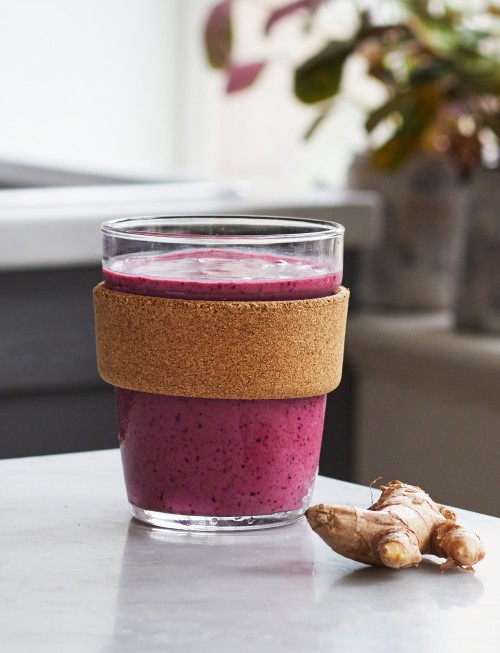As cold and flu season sets in, out come the bottles of supplements, homemade remedies and ‘immune-boosting’ miracle cures, as we search for an elusive holy grail to ward off the dreaded winter illnesses. But the truth is, there’s no single food or specific diet that will ‘boost’ your immunity (sorry!). Furthermore, the idea of ‘boosting’ your immune system is misleading and scientifically inaccurate.
The immune system is a complex network of cells, tissues and organs that work together to help the body fight infection — it’s constantly working to respond to and protect us from pathogens such as bacteria, viruses, and toxins. When you feel under the weather with a cough, runny nose or fever, these symptoms are not caused by germs, but instead are signs that your immune system is fighting back against an infection. To ‘boost’ your immune system would be to enhance these unpleasant symptoms. Instead, we should take a 360 approach to supporting a healthy immune system, which works best when it’s balanced.
Here are our top five tips to strengthen your immune system this winter.
1. Load up on wholefoods
When it comes to immunity, we need to ensure that our diet provides the right micronutrients (vitamins and minerals) to function at its best when under attack. When we’re fighting an infection, our immune system becomes increasingly active and requires additional nutrients to provide energy for battle, as well as to heal and repair. Poor diet may contribute to a weakened immune response. While a balanced diet won’t prevent you from catching an infection, it may help you to deal with it more effectively.
Essential micronutrients for a properly functioning immune system include vitamins A, C, D, E, B2, B6, and B12, folate, iron, selenium, and zinc. Focusing on a food-first approach, you should be able to obtain enough of these micronutrients in a balanced, varied diet. However, there are exceptions: vitamin D deficiency may be linked with a reduced immune response — it’s difficult to obtain vitamin D from diet or from the sun during winter, so government guidelines recommend that everyone take a daily supplement of 10 micrograms between October and March; vitamin B12 is involved in immune cell synthesis and is mainly found in animal products, so plant-based eaters may need to supplement (the recommended daily allowance for adults is 1.5 micrograms).
Research indicates that around 70% of our immune system, including more than 80% of all antibody-secreting plasma cells, is found in the gut. So making sure we look after our gut health may be a sure-fire way to promote healthy immunity. Including plenty of fibre in our diet, by aiming for at least 30g per day and 30 different plant foods per week, is a great way to nurture and support the diversity of our gut microbiome and in turn strengthen our immunity. Probiotics found in fermented foods such as kefir, kombucha and kimchi also increase the diversity of beneficial gut bacteria. Prebiotics, found in plant-based foods, including onions, garlic and leeks, feed these beneficial bacteria and enable them to flourish.
A healthy diet contains a balance of protein, carbohydrates and fat. Protein is essential for the body to repair, to fight off infections and is needed to make immune cells and antibodies, so make sure to include high quality protein with every meal (think tofu, beans, lentils, nuts and seeds). Omega 3 fatty acids also help to support immune function — sources include flaxseeds, hemp and chia seeds and walnuts. It’s also important to eat enough complex carbohydrates throughout the day to provide fuel for a healthy immune system.
Key foods containing immune-supporting micronutrients:
Vitamin A: carrots, bell peppers, sweet potatoes
Vitamin C: citrus fruit, bell peppers, strawberries
Vitamin E: wholegrains, nuts and seeds (including sunflower and almonds)
Vitamin B2: mushrooms, fortified cereals, tofu
Vitamin B6: broccoli, peanuts, wholegrains
Folate: green leafy vegetables, wholegrains, chickpeas
Iron: tofu, edamame beans, wholegrains
Selenium: Brazil nuts, oats, sunflower seeds
Zinc: oats, lentils, pumpkin seeds
2. Stay hydrated
We probably all know that drinking enough water is important for overall health, but did you know that your immune system relies on a well-hydrated body? Water is needed throughout the digestive process, but particularly when it comes to absorbing nutrients into the bloodstream — and as we know, sufficient nutrients are essential for healthy immunity.
Water is also a key component of the lymphatic system, which works closely with the immune system. An important fluid called lymph is made up of about 90% water and circulates through the body, helping to remove waste products, toxins and pathogens from the body; as well as transporting infection-fighting white blood cells throughout the body. Therefore, it makes sense that dehydration may impact the effectiveness of this drainage system.
Another way that water supports immunity is by maintaining the health of the mucosal barriers, or the protective linings, inside the body. Found in a variety of places including the mouth, nasal passages and the gut, these barriers prevent foreign invaders from entering the body. Dehydration can cause them to dry out, so they can’t do their job properly and germs can creep in. Dehydration may also decrease production of saliva, which contains the antibody IgA, the body’s first line of defence. So as well as drinking the recommended eight glasses of fluid per day (which will vary depending on your lifestyle), try to include hydrating foods such as soups, stews, smoothies and fruit as part of a balanced diet.
3. Move your body
Moderate, regular exercise helps support the immune system by increasing levels of immune cells and antibodies, improving circulation and reducing stress. Research has found that adults who exercise for at least 20 minutes, five times per week or more, reported 43% fewer days with respiratory infections and when they were unwell, their symptoms were less severe. So regular exercise may improve the odds of you fighting off that seasonal lurgy.
But more is not necessarily better when it comes to exercise and immunity. Increasing the duration or intensity of your exercise may lead to you over-stressing the immune system, impairing it from working effectively and leaving you more susceptible to coughs and colds. Government guidelines recommend 150 minutes of moderate exercise, spread throughout the week, whether that’s a run, an at-home workout, a brisk walk or a yoga session. But remember, if you do feel unwell, the most important thing you can do is rest.
4. Relax
Have you ever noticed that you come down with a cold after a stressful time at work? Feeling constantly stressed may have a negative effect on your immune system and leave you open to infection. Chronic stress leads to the body releasing large amounts of the stress hormone cortisol, which can hamper your body’s immune function. Over time, this high level of cortisol may lead to chronic inflammation, which increases the risk of many diseases. Elevated cortisol is also associated with reduced levels of white blood cells and interferes with the communication between these cells, making your immune system’s response to infection much slower.
So how do we reduce our cortisol levels to strengthen our immune system? Learning to manage stress can help to keep our cortisol levels under control and benefit our overall health. Research shows that regular exercise, as well as mindfulness, breathwork and yoga, is great for relieving stress. Preliminary research has also found that people who took part in eight weeks of daily meditation, produced more antibodies to the flu virus than those who didn’t meditate. Try to make time every day to find what works for you, so that you can disconnect from the world and allow yourself to relax.
5. Prioritise sleep
Regular, good quality sleep is crucial for healthy immune function. Sleep is an important time for the body to restore and repair, playing an important part in the strength of our immune system. During sleep, levels of cytokines (molecules that allow your cells to talk to each other) increase — these are essential for the regulation of the immune system. Research suggests that sleep strengthens immune ‘memory’, meaning that it reinforces the immune system’s ability to recognise and respond to dangerous antigens. So lack of sleep may impact the body’s ability to fight infections. A large scientific study found that people who had trouble sleeping were 29% more likely to develop a cold and those who slept for less than five hours were more susceptible to getting ill, compared to people who slept for seven or eight hours.
So when we’re thinking of supporting our immune health, good sleep must be a priority. Try to keep regular sleep hours, create a calming bedtime routine, limit devices at least 30 minutes before bed and try to get daylight exposure as early as possible each morning.
 Membership
Membership Our Story
Our Story



















